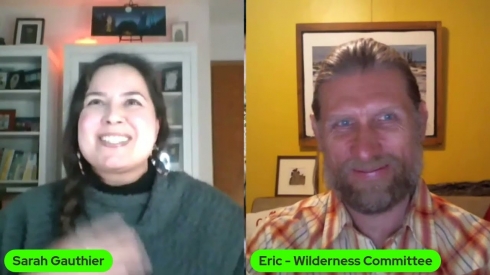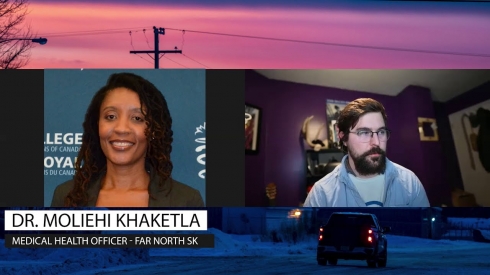- Mettre en route la vidéo
- Cliquer sur l’icône « CC » (Sous-titre) en bas à droite
- Cliquer sur l’icône « Settings » (Paramètre) en bas à droite
- Cliquer sur «Subtitles » (Sous-titres)
- Cliquer sur « Auto-translate » (Traduire automatiquement)
- Sélectionner la langue de votre choix
[Live Stream, Feb 10 2021] For Peat's Sake - Why Northern Saskatchewan Muskeg Matters
'Why Northern Saskatchewan Muskegs Matter and How We Can Protect Them' was an online Facebook Live event hosted by the For Peat's Sake Advocacy group in relation to Quebec-based Lambert Peat's application to mine northern moss as a resource.
"Join us in a night of learning and discussion with Biologist Elizabeth Bekolay, who will be our guide in conversation with special guests: Elder Sally Milne, Tina Giroux-Robillard, MSc Indigenous Protected and Conserved Areas (IPCA) Project Manager - Ya-thi Nene Lands & Resources and Dr. Priscilla Settee, Professor of Indigenous Studies at the University of Saskatchewan.
Elizabeth Bekolay BSc is a nature-based educator, naturalist, writer, and mother. She was born and raised in Prince Albert and spent much time as a child, youth, and adult exploring the ecology of the forests and muskegs of the North, especially around Weyakwin Lake. In late 2018, she wrote her first children’s book that is set in a muskeg facing the challenges of peatland draining and mining. She now resides in Saskatoon and works as a nature-based educator with Brightwater, Science, Environmental, and Indigenous Learning Center and runs a small business; Lichen Nature Design and Education.
Elder Sally Milne, 77, is a Cree woman from Stanley Mission, Saskatchewan. She has a depth of experience including working for the LLRIB School and the LLRIB Curriculum Resource Unit; Saskatchewan Justice; the Stanley Mission Band schools and has spent time living mostly solo at the trapline. Sally started being asked to provide Elder services for the community she was living in, in the early nineties. She would open meetings, speak to young people, and conduct traditional Cree Spiritual ceremonies. Forced to retire due to heart disease, Sally is now recovering and riding out the pandemic at an acreage close to Prince Albert, SK. Under the tutelage of Sally’s caring adopted son, Sally is improving her health and is preparing to launch her artwork soon. With utmost humility, Sally will speak on what the land means and does for the Indigenous peoples and why the land should be understood as an inseparable part of the continuity of the people.
For over 15 years, Tina has been working with First Nation communities as a wildlife biologist, regulatory officer, policy analyst, and advocate. Tina Giroux, M.Sc. (Biology) Owner/Biologist, Willow Consulting has been primarily through her work with the Federation of Sovereign Indigenous Nations in fish habitat protection, and most recently with the Athabasca Denesųłiné on barren ground caribou stewardship, using Traditional Ecological Knowledge as a primary source of data in various studies and assisting communities in the protection of Treaty and aboriginal rights. Tina is currently working as project manager with Ya’thi Nene Lands & Resources, for the creation of Indigenous Protected and Conserved Areas (IPCAs) in the Athabasca region. Once implemented, these will be the first IPCAs in the province of Saskatchewan, but hopefully not the last! Tina grew up in the Christopher Lake region and is currently living near Paddockwood with her husband and enjoying her new role as a grandmother!
Lastly Dr. Priscilla Settee is a member of Cumberland House Swampy Cree First Nations and a Professor of Indigenous Studies where she teaches courses on Indigenous Food Sovereignty and Indigenous Social Economies. Dr. Settee’s new co-edited book is called Indigenous Food Systems Concepts, Cases and Conversation was released in January 2020. Settee serves on the Seed Change Canada and Culture Conservancy(U.S.) boards and is a David Suzuki Fellow for 2019-20 where she is currently researching the impact of climate change on Indigenous trapping , hunting and land based livelihoods."
Ajouter un commentaire
Les débuts de la Missinipi Broadcasting Corporation remontent au début des années 80. Auparavant, le nord n'avait reçu qu'une attention symbolique dans le domaine des communications.
Aujourd'hui, MBC est entendu dans plus de 70 communautés, y compris dans de nombreuses villes du sud où des milliers d ’« Autochtones vivant en milieu urbain » habitent maintenant, mais souhaitent toujours se tenir au courant de ce qui se passe dans le nord. La programmation crie et dénée de MBC est reconnue à l’échelle nationale comme chef de file dans le domaine des communications autochtones et a été partagée avec des auditoires aussi loin que les Territoires du Nord-Ouest, l’Alberta, la Colombie-Britannique et l’Ontario.





Commentaires
Nous encourageons les commentaires qui favorisent le dialogue sur les histoires que nous publions. Les commentaires seront modérés et publiés s'ils respectent ces lignes directrices:
Le portail des médias communautaires se réserve le droit de rejeter tout commentaire ne respectant pas ces normes minimales.